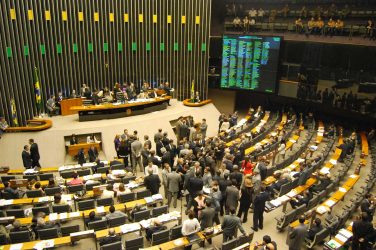As a listless workday at the Lula Institute drew to a close on Thursday, April 5, 2018, ex-president Dilma Rousseff, Senator Cid Gomes, Paraná senator and Workers’ Party (PT) president Gleisi Hoffmann, and Lula’s lawyers Valeska Teixeira and Cristiano Zanin sipped coffee and talked, while waving goodbye to the last few workers as they trickled out of the building.
From a strictly legal perspective, after the Supreme Court ruling, everyone there knew that Lula’s arrest warrant could come at any moment. The feeling, however, was that there was no reason it should happen immediately.
Lula was certain that he was going to be free over the weekend, and he left his second-floor office, descended a spiral staircase to a short hallway with two sofas and matte glass walls, and asked for his young assistant, the sociologist Marco Aurélio “Marcola” Santana Ribeiro, if he could place a call for him to Moisés Selerges, director of the ABC Metalworkers’ Union and one of Lula’s good friends.
Sitting with his back to the front door of the institute, Lula bluntly told his friend Marcola that he thought he was going to be arrested the following week. He asked him to organize a “secret barbecue” for a small group of friends that Saturday morning behind the union hall so he could relax “with some ribs and a little cachaça.”
As he waited for Lula to hand him back his phone, Marcola was surprised to see the lawyers, Teixeira and Zanin, storm in through the front door, looking furious. One step in front of her husband, Teixeira showed her smartphone screen revealing a headline from the news website UOL that was going viral around the world: “Moro Orders Lula’s Imprisonment.”
Accustomed to Brazil’s woefully lethargic judiciary, the husband/wife team hadn’t imagined that the judges at Porto Alegre’s Fourth Regional Federal Court (known as the TRF-4) would act in record time and, in the course of a single afternoon, authorize Moro to issue an arrest warrant. In the three final paragraphs of the ruling, published online, the judge had transformed Lula’s legal rights of the accused into “concessions”:
Relative to the conviction of ex-president Luiz Inácio Lula da Silva, we concede, in respect to his former office, the opportunity for him to turn himself in voluntarily to the Federal Police in Curitiba by 5:00 p.m. on 4/06/2018, at which point he will begin serving his sentence.
The use of handcuffs is prohibited under any circumstances.
The logistical details of his arrival must be negotiated with the Paraná Federal Police superintendent, Agent Maurício Valeixo.
Be aware that, due to the dignity of the office he held, a special room has been prepared in the Federal Police headquarters for the beginning of the sentence, in which the ex-president will be separated from the other prisoners without incurring any risk to his moral or physical integrity.
Sergio Fernando Moro Curitiba, 4/05/2018, 5:50:10 p.m.
The arrest warrant was front-page news in all of Brazil’s newspapers and many of the biggest outlets around the world, and the rumor that there might be resistance had brought foreign correspondents and activists from all over the country.
Traveling by car, bus, and airplane, a babel of politicians, social activists, legal scholars, priests, evangelical pastors, Buddhist monks, musicians, TV and movie stars, football legends, and mothers with babies in their arms gathered in the streets of São Bernardo do Campo.
An article published online by Brazil’s largest newspaper, Folha de São Paulo, that morning claimed, with no source, that part of the crowd was made up of “poor teenagers” who had been recruited from the periphery of São Paulo by the state public teachers union to “thicken the crowd in the protest defending Lula.”
One thing that was certain was that the majority of the people in the street, in disagreement with all the lawyers and some of the politicians, wanted Lula to resist rather than turn himself in quietly. For an unarmed crowd to defend against a battalion of military riot police and Federal Police special forces, however, seemed like complete madness.
Lula exuded calm. Although he had slept only four hours, he woke up the next day in a good mood and spent an hour and a half on the treadmill and other exercise equipment that was brought there from his house, then took a shower.
He put on a pair of jeans and a light-blue T-shirt, along with a blue striped jacket that Bolivian president Evo Morales had given him, and circulated through different groups, hugging people, consoling those who were crying, and making jokes with old friends whom he hadn’t seen since the protests of the 1980s. From time to time, these conversations were interrupted to conduct closed-door meetings with union, social movement, and party leaders.
The three streets around the hall were completely blocked off, occupied by tents that were set up wherever anyone could find a patch of ground, filled with people who had decided to stay there until Lula announced what he was going to do. Among the red party and social movement flags, the war cry continued as it had from the beginning, “Don’t surrender! Don’t surrender! Don’t surrender!”
“I am innocent, and I would resist if I could, but I am convinced that this is the best decision”
One of the first people to return to the union hall the next morning, at seven o’clock, was MTST leader Guilherme Boulos. Learning he was in the building, Lula invited him for breakfast in the small room adjoining his bedroom in the basement. He told him he had decided to obey the arrest warrant, but that he would not turn himself in at the Federal Police headquarters. They would have to pick him up at the union hall.
Boulos insisted on resistance. “I respect your point of view, President, but I still think the best alternative is to expose your enemies’ contradictions. Getúlio Vargas killed himself, João Goulart was exiled. How will you go down in history? What will they do? Are they going to gun down thousands of people in the streets? Will they violently invade the union hall to remove you? All of the international press is outside. This will expose them to worldwide hatred. It will expose Moro’s persecution of you. But if this is your decision, I respect it.”
After breakfast, Boulos walked down the narrow hallway and, while approaching Lindbergh Farias, who was on his way to meet with Lula, shook his head no. “Forget about it,” he said. “There’s no way. He’s made up his mind.”
The young senator didn’t give up. He sat down next to Lula and made a final attempt to convince him to resist. “President, I know that it’s all pretty much been decided, but I ask you to hear me out. You are innocent. You have committed no crime. You haven’t done anything wrong, and there is no reason for you to turn yourself in. You are not obligated to do this. The whole nation and the world have their eyes on São Bernardo, and the repercussions are very positive so far. If we flood the streets with people, we can trigger a stalemate and will have a chance of getting your habeas corpus next week.”
Lula listened to Lindbergh in silence, stroking his beard. Then he told the senator that he understood and even agreed with his argument, but that he was convinced that resistance could result in a bloodbath.
“I don’t want anyone injured. I don’t want anyone to get hurt,” Lula said. “But I’m not going to get in a car and turn myself in at the police station like Moro is demanding. I refuse. I don’t accept it. If they want me, they can come and get me here.”
This is an edited excerpt from Fernando Morais’ new biography of Lula
Fernando Morais is one of Brazil’s most important contemporary writers and journalists. He has received the Esso Award three times and the April Award for journalism on four occasions. Morais works have sold more than two million copies in more than nineteen countries.
This article appeared originally in Open Democracy – https://www.opendemocracy.net/













